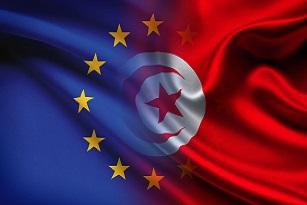
The European Commission, on behalf of the EU, has approved today the disbursement of a €150 million loan to Tunisia.
This is the third and final disbursement under the second Macro-Financial Assistance (MFA) programme to Tunisia, and follows the completion of an important set of policy measures intended to support the country's economic transition.
The disbursement of MFA funds is conditional on the implementation of specific policy measures agreed in a Memorandum of Understanding. The reforms undertaken as part of this MFA reflect the efforts made by Tunisian authorities to implement a set of far-reaching reforms designed to fight corruption, build a more equitable tax system, increase the quality of public administration, and improve the country's social protection system. The programme has also supported reforms to enhance labour market policies and reduce unemployment, especially among the youth, as well as improve the business climate in Tunisia.
Following these reform efforts and the recent strong democratic support to continue the transition begun in 2011, Tunisia can count on the EU's partnership to strengthen its economy and political governance, to improve Tunisians' daily lives and ensure social protection for all. The EU will continue to support Tunisia in its efforts to address the remaining economic, financial and institutional reform challenges in support of growth and the socio-economic transition.
Pierre Moscovici, Commissioner for Economic and Financial Affairs, Taxation and Customs, said: “This disbursement underlines our sustained commitment to supporting Tunisia and its people. While the country has delivered on key policy commitments these past years, pursuing and deepening economic and structural reforms remains essential to building on Tunisia's democratic and political achievements, and securing a more prosperous future. We thus stand ready to work closely with Tunisia to help deliver on the reforms necessary to secure investment, jobs and inclusive growth for the benefit of its people, notably its youth”.
The second MFA programme was proposed in 2015 to support Tunisia's economic recovery. The disbursement of MFA funds is conditional on the implementation of specific policy measures agreed in the Memorandum of Understanding. The MFA programme was designed to assist Tunisia in covering its external financing needs while implementing a wide-ranging and ambitious structural reform agenda.
The European Parliament and the Council adopted the second MFA programme, worth €500 million, in July 2016. With today's disbursement, the EU has now provided Tunisia with €800 million in MFA funds since 2015.
Background
MFA programmes are part of the EU's wider engagement with neighbouring countries and are intended as an exceptional EU crisis response instrument. They are available to EU neighbouring countries experiencing severe balance-of-payments problems. This instrument includes the respect of human rights and effective democratic mechanisms, including a multi-party parliamentary system and the rule of law, as pre-conditions.
MFA is also conditional on the existence of a non-precautionary credit arrangement with the IMF and a satisfactory track-record of implementing IMF programme reforms.
MFA funds are released in tranches strictly tied to the fulfilment of conditions aimed at strengthening macro-economic and financial stability. These conditions are listed in a Memorandum of Understanding signed between the EU and the beneficiary country.
Unlike other forms of financial aid to non-EU members, the Commission proposes MFA programmes before both the European Parliament and the Council approve them. The first MFA operation with Tunisia was concluded in July 2017 and provided €300 million in loans.
Following Tunisia's request, the Commission proposed a second MFA programme worth up to €500 million in February 2016. The European Parliament and the Council adopted the Commission proposal in July 2016. The policy conditions agreed between the EU and Tunisia are laid down in the Memorandum of Understanding (MoU) and Loan Facility Agreement signed in Brussels on 27 April 2017.
For the release of the third and final disbursement under the second MFA programme, the specific measures were designed to support fiscal consolidation and sustainable economic growth in the country. They included reforms better to protect depositors' savings in Tunisian banks, increase transparency in public financial management, strengthen social safety nets to assist vulnerable Tunisians, facilitate bilateral exchanges through enhanced air connections with the EU, and improve the country's business climate to help attract domestic and foreign investment.
EU-Tunisia relations
Since the beginning of the 2011 Revolution, Tunisia has been working towards a modern democracy based on freedoms, economic development, and social justice. The European Union has been Tunisia's key partner in this process. Cooperation in a wide range of domains has been reinforced through the Privileged Partnership established in 2012.
The EU's commitment to support Tunisia to help it achieve its ambitions was reiterated in the 2016 Joint Communication "Strengthening EU support for Tunisia" and through the launch, by High Representative/Vice President Mogherini and late President Caïd Essebsi, of the EU-Tunisia Youth Partnership which is high on the common bilateral agenda. The 15th meeting of the EU-Tunisia Association Council in May 2019 highlighted the importance of the bilateral relationship and EU support for inclusive and sustainable development in the country.
The EU remains committed to strengthening its privileged partnership with Tunisia. It has boosted its financial assistance for Tunisia in order to help it in consolidating its democratic transition and reviving its economy. The EU's strategy of assistance to Tunisia makes use of a wide range of financial and technical assistance instruments, including budget support programmes under the European Neighbourhood Instrument (ENI), of which Tunisia is a major recipient among the Southern Neighbourhood countries (€300 million in grants per year since 2017), benefiting also from substantial loans from the European Investment Bank.
The EU's relations with Tunisia go beyond financial assistance and development funding, into cooperation on a broad-range of policy areas and opportunities for EU-Tunisia cooperation, including under EU's initiatives such as Creative Europe, Erasmus+ or Horizon2020.
For more information
- Detailed information on MFA for Tunisia
- More information on EU relations with Tunisia
Details
- Publication date
- 30 October 2019
- Author
- Directorate-General for Neighbourhood and Enlargement Negotiations
